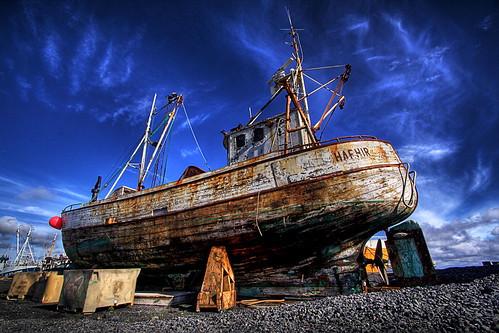The Last Days Of Fish
Posted by Big Gav in fish, fishing, ocean
GOOD Magazine has a look at the world's dwindling fish stocks - Fin: The Last Days of Fish.
The first to suffer were the fishermen of Newfoundland, who saw their industry collapse in the early 1990s. Later it was the fishing communities further south, along the Gulf of Maine. Fishermen of the southern Cape, like Ligenza, could still find enough cod even five or six years ago to make a decent living, but that, too, has changed. Today, cod populations in the Georges Bank, off Cape Cod, hover near the brink, at levels 10 percent of what scientists consider healthy. Large areas of the Bank are losed entirely to groundfishing.
By now, the collapse is a well-known story in New England, chronicled in books like Mark Kurlansky’s Cod and in newspaper accounts of riotous fishery meetings and bank foreclosures in port towns. But it is only part of the story. Less appreciated is what else is missing from the New England coast. The number of overfished or threatened species makes for a sobering list: Atlantic halibut, yellowtail flounder, haddock, wolffish, river herring, Atlantic salmon. Shark populations in the North Atlantic have dropped by half since 1986, in the same time that bluefin tuna, which once swept past the Cape in schools a hundred thick, have been brought near commercial collapse. The astonishing fecundity of the New England coast has been reduced to a memory—one that haunts a generation of fishermen. In Harwich, on the Cape, a fisherman points me to a map of the coastal channels he once fished and covers it with a big, callused hand. “You can’t find anything there anymore,” he says.
What has transpired off the shores of Cape Cod is not unique. The same has occurred on coasts throughout the world. In 1988, at the peak of the output of the world’s fisheries, boats around the globe landed something on the order of 80 million tons of fish. Since then, depending upon which numbers you believe, the world’s annual catch has either plateaued or fallen by as much as 500,000 tons a year.
The rise of industrial fishing in the latter half of the 20th century, coupled with a growing world population, has overmatched the ocean’s supply. And while the history of New England fishing might seem a stark example—and it is—American fisheries are actually among the most enlightened in the world (though that is not saying much), with stringent management plans and some notable fish recoveries. In Europe, by contrast, nearly half of fish stocks are considered seriously depleted, and the North Sea has become a relatively barren body of water (to fill their nets, the “distant water” fleets of Europe now sail the west coast of Africa). And while fish stocks dwindle worldwide, an estimated 90 percent of large predatory fish—tuna, swordfish, cod, halibut—have disappeared since the mid-20th century. One study, published almost two years ago in Science, predicted a worldwide collapse of commercial fish stocks in just 40 years, if the present pace of fishing continues.
The demise of commercial fishing is beyond the limits of even our darkest environmental imaginations. And yet the evidence of the ocean’s diminishment is everywhere. Leaving aside the legitimate concerns of conservationists, the possibility of a broad fish collapse is harrowing for other reasons. At a time when we are mired in a global food crisis, nearly 1.5 billion people depend upon the sea as a source of food or income. The destabilizing effect of such a collapse would be tremendous, bringing communities and countries into conflict over a resource we once considered boundless. It is fair to say that the endgame has begun.






